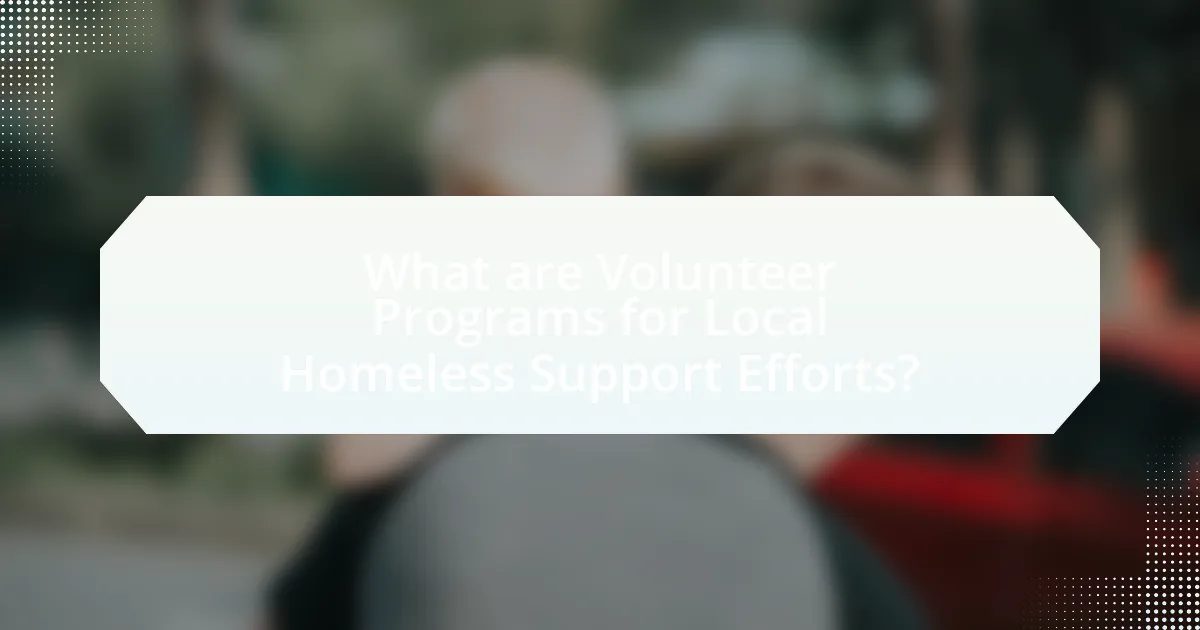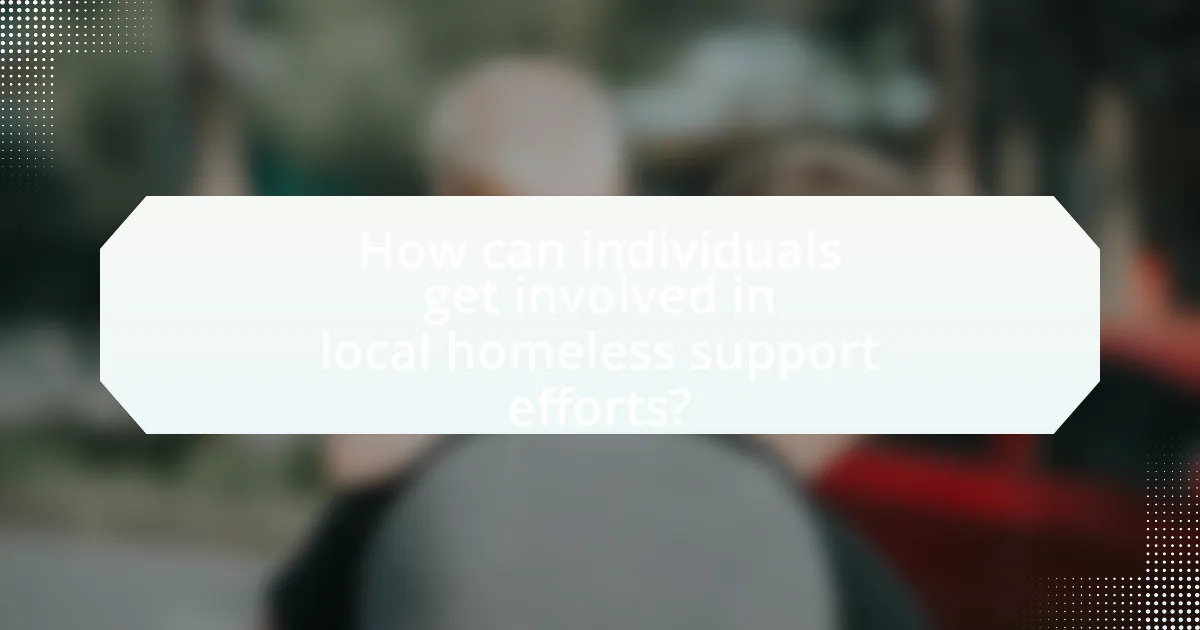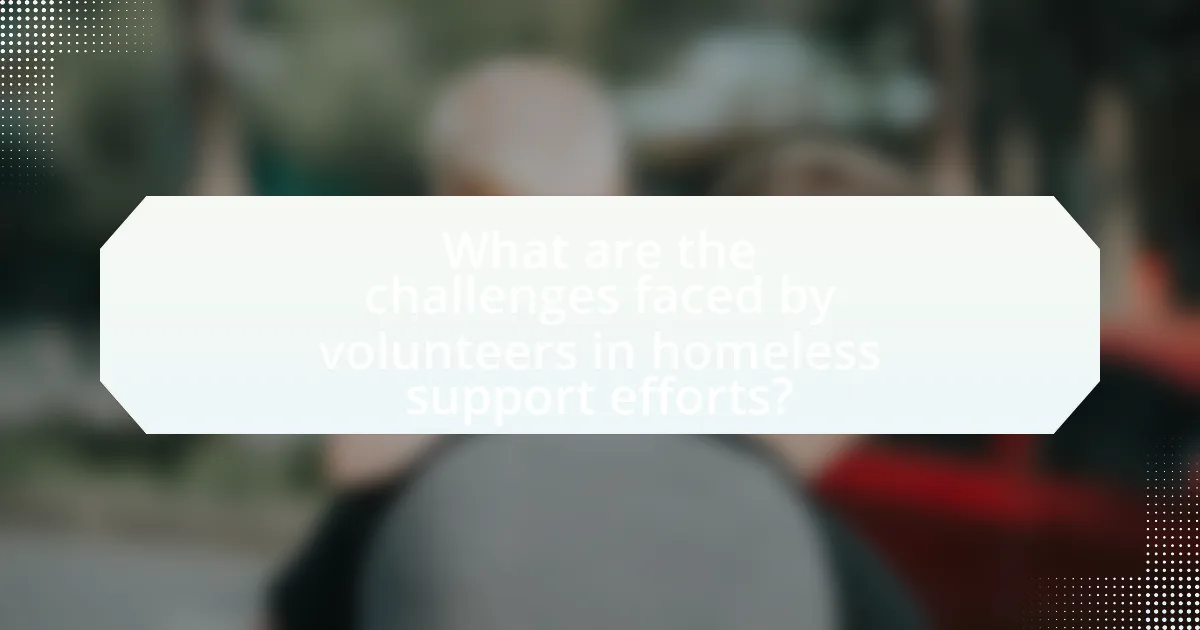Volunteer programs for local homeless support efforts are organized initiatives that engage community members in providing essential services to individuals experiencing homelessness. These programs encompass activities such as food distribution, shelter assistance, medical care, and job training, significantly enhancing the effectiveness of local outreach efforts. Local nonprofit organizations typically coordinate these initiatives, relying on volunteers to address immediate needs and foster long-term recovery. The article outlines how individuals can get involved, the skills required, the challenges faced by volunteers, and the impact of their contributions on local homeless communities. Additionally, it highlights best practices for effective volunteering and ways to measure the impact of their efforts.

What are Volunteer Programs for Local Homeless Support Efforts?
Volunteer programs for local homeless support efforts are organized initiatives that engage community members in providing assistance to individuals experiencing homelessness. These programs typically include activities such as distributing food, offering shelter, providing medical care, and facilitating job training. For instance, the National Alliance to End Homelessness reports that volunteer involvement can significantly enhance the effectiveness of local shelters and outreach programs, leading to improved outcomes for homeless individuals. Additionally, local organizations often rely on volunteers to help raise awareness and funds, further supporting their mission to combat homelessness in the community.
How do these volunteer programs operate?
Volunteer programs operate by coordinating efforts between organizations and individuals to provide support and services to homeless populations. These programs typically involve recruitment of volunteers, training them on specific tasks, and assigning them to various roles such as food distribution, shelter assistance, or outreach services. For example, organizations like the National Alliance to End Homelessness report that structured volunteer programs can significantly enhance service delivery and community engagement, leading to improved outcomes for those experiencing homelessness.
What types of activities do volunteers typically engage in?
Volunteers typically engage in activities such as distributing food, providing shelter assistance, offering medical care, and facilitating educational programs for homeless individuals. These activities are essential for addressing immediate needs and supporting long-term recovery. For instance, food distribution programs often serve thousands of meals weekly, highlighting the critical role volunteers play in alleviating hunger among the homeless population. Additionally, organizations like the National Alliance to End Homelessness report that volunteer-led initiatives significantly enhance the effectiveness of support services, demonstrating the impact of volunteer engagement in community efforts.
Who organizes these volunteer programs?
Local nonprofit organizations and community service groups typically organize these volunteer programs. These entities focus on addressing homelessness and often collaborate with local governments and businesses to create effective support initiatives. For example, organizations like Habitat for Humanity and local food banks frequently coordinate volunteer efforts to assist homeless individuals and families in their communities.
Why are volunteer programs important for homeless support?
Volunteer programs are crucial for homeless support because they provide essential services and resources that directly address the needs of homeless individuals. These programs often offer food, shelter, medical care, and social services, which are vital for improving the quality of life for those experiencing homelessness. For instance, a study by the National Alliance to End Homelessness found that volunteer-driven initiatives can significantly reduce the number of individuals living on the streets by connecting them with necessary support systems. Additionally, volunteers help raise awareness about homelessness, fostering community engagement and encouraging more comprehensive solutions to this social issue.
What impact do volunteers have on local homeless communities?
Volunteers significantly enhance local homeless communities by providing essential services, resources, and support. Their involvement often leads to improved access to food, shelter, healthcare, and social services, which are critical for individuals experiencing homelessness. For instance, a study by the National Alliance to End Homelessness found that volunteer-driven initiatives, such as meal programs and outreach services, can reduce homelessness rates by fostering connections between individuals and available resources. Additionally, volunteers contribute to raising awareness and advocating for policy changes that benefit homeless populations, further amplifying their positive impact on community well-being.
How do these programs contribute to broader social change?
Volunteer programs contribute to broader social change by addressing systemic issues related to homelessness and fostering community engagement. These programs provide essential services such as food distribution, shelter support, and job training, which directly alleviate the immediate needs of homeless individuals. For example, a study by the National Alliance to End Homelessness found that communities with active volunteer programs saw a 30% reduction in homelessness over five years. Additionally, these initiatives raise awareness about the complexities of homelessness, encouraging public discourse and policy advocacy that can lead to long-term solutions. By mobilizing community members, volunteer programs create a culture of empathy and responsibility, ultimately driving societal shifts towards inclusivity and support for vulnerable populations.

How can individuals get involved in local homeless support efforts?
Individuals can get involved in local homeless support efforts by volunteering with organizations that provide services to the homeless population. Many local shelters, food banks, and outreach programs actively seek volunteers to assist with meal preparation, distribution of supplies, and providing companionship to those in need. For example, the National Alliance to End Homelessness reports that community involvement significantly enhances the effectiveness of local programs, as volunteers help to bridge the gap between resources and those experiencing homelessness. Additionally, individuals can participate in fundraising events or donation drives organized by these organizations, further supporting their mission to assist the homeless community.
What steps should one take to find volunteer opportunities?
To find volunteer opportunities, one should start by researching local organizations that focus on homelessness and community support. This can be done by visiting websites of shelters, food banks, and non-profits that serve the homeless population. Many of these organizations list volunteer opportunities directly on their websites, providing details on how to apply and the types of roles available. Additionally, utilizing platforms like VolunteerMatch or Idealist can help connect individuals with local volunteer needs based on their interests and skills. Engaging with community bulletin boards or social media groups dedicated to local events can also reveal upcoming volunteer opportunities. According to a 2021 report by the Corporation for National and Community Service, approximately 77 million Americans volunteered, highlighting the accessibility and importance of community involvement.
Where can individuals look for local volunteer programs?
Individuals can look for local volunteer programs through community centers, nonprofit organizations, and online platforms such as VolunteerMatch and Idealist. Community centers often have bulletin boards or staff who can provide information about local opportunities. Nonprofit organizations frequently list volunteer needs on their websites or social media pages. Online platforms like VolunteerMatch and Idealist aggregate various volunteer opportunities, allowing individuals to search by location and interest, making it easier to find relevant programs.
How can social media be utilized to discover opportunities?
Social media can be utilized to discover opportunities by providing platforms for organizations to share volunteer openings and events in real-time. Many nonprofits and community groups actively post about their needs for volunteers, upcoming events, and specific projects on platforms like Facebook, Twitter, and Instagram. For instance, a study by the Pew Research Center found that 69% of adults in the U.S. use social media, making it a vital tool for outreach. Additionally, hashtags related to volunteerism, such as #Volunteer or #HomelessSupport, can help individuals find specific opportunities in their local area.
What skills or qualifications are needed to volunteer?
To volunteer, individuals typically need skills such as communication, empathy, and teamwork, along with a willingness to learn and adapt. These skills enable effective interaction with diverse populations, particularly in homeless support efforts, where understanding and compassion are crucial. Additionally, some programs may require specific qualifications, such as background checks or training in areas like first aid or crisis intervention, to ensure the safety and well-being of both volunteers and those they serve.
Are there specific training programs for volunteers?
Yes, there are specific training programs for volunteers involved in local homeless support efforts. These programs are designed to equip volunteers with the necessary skills and knowledge to effectively assist individuals experiencing homelessness. For instance, organizations like the National Alliance to End Homelessness offer training modules that cover topics such as crisis intervention, resource navigation, and understanding the complexities of homelessness. Additionally, local shelters and outreach programs often provide tailored training sessions that address the unique needs of their communities, ensuring that volunteers are well-prepared to make a positive impact.
What personal qualities are beneficial for volunteers?
Beneficial personal qualities for volunteers include empathy, reliability, and strong communication skills. Empathy allows volunteers to connect with those they are helping, fostering a supportive environment. Reliability ensures that volunteers can be counted on to fulfill their commitments, which is crucial in maintaining trust within the community. Strong communication skills enable volunteers to effectively convey information and collaborate with team members and those they serve. These qualities enhance the overall impact of volunteer efforts in local homeless support initiatives.

What are the challenges faced by volunteers in homeless support efforts?
Volunteers in homeless support efforts face several challenges, including emotional strain, resource limitations, and safety concerns. Emotional strain arises from witnessing the hardships faced by homeless individuals, which can lead to burnout and compassion fatigue. Resource limitations often hinder volunteers’ ability to provide adequate support, as many organizations operate on tight budgets and lack sufficient supplies. Safety concerns are prevalent, as volunteers may encounter unpredictable situations or individuals in crisis, necessitating training and awareness to ensure their own safety while assisting others.
What common obstacles do volunteers encounter?
Volunteers commonly encounter obstacles such as time constraints, lack of training, and emotional challenges. Time constraints arise when volunteers struggle to balance their commitments with personal and professional responsibilities, limiting their availability to participate in volunteer activities. Lack of training can hinder volunteers’ effectiveness, as they may not feel adequately prepared to handle specific tasks or situations, particularly in complex environments like homeless support. Emotional challenges, including compassion fatigue and burnout, can also affect volunteers, as they may find it difficult to cope with the emotional toll of working with vulnerable populations. These obstacles can significantly impact the overall effectiveness and sustainability of volunteer efforts in local homeless support programs.
How can volunteers overcome these challenges?
Volunteers can overcome challenges in local homeless support efforts by engaging in thorough training and building strong community partnerships. Training equips volunteers with the necessary skills to handle various situations, such as understanding the needs of the homeless population and managing emotional stress. Research indicates that well-trained volunteers are more effective, as they can respond appropriately to crises and provide better support (National Alliance to End Homelessness, 2021). Additionally, forming partnerships with local organizations enhances resource sharing and creates a support network, which can alleviate feelings of isolation and overwhelm among volunteers. Collaborative efforts lead to more comprehensive solutions and a greater impact on the community.
What support systems are available for volunteers?
Support systems available for volunteers include training programs, mentorship opportunities, and access to resources such as materials and transportation. Training programs equip volunteers with necessary skills and knowledge, while mentorship connects them with experienced individuals for guidance. Additionally, organizations often provide resources like food, clothing, and shelter supplies to facilitate volunteer efforts, ensuring that volunteers can effectively contribute to local homeless support initiatives.
How can volunteers ensure their efforts are effective?
Volunteers can ensure their efforts are effective by aligning their skills and interests with the specific needs of the homeless community they aim to support. This alignment allows volunteers to contribute meaningfully, as evidenced by studies showing that targeted volunteer efforts lead to higher satisfaction and better outcomes for both volunteers and beneficiaries. For instance, a report by the Corporation for National and Community Service highlights that volunteers who engage in roles that match their skills are more likely to have a lasting impact on the communities they serve. Additionally, effective communication with local organizations helps volunteers understand the most pressing needs, ensuring their contributions are relevant and impactful.
What best practices should volunteers follow?
Volunteers should follow best practices such as effective communication, reliability, and respect for the individuals they serve. Effective communication ensures that volunteers understand the needs of the organization and the people they are helping, which is crucial in homeless support efforts. Reliability is essential, as consistent attendance and commitment build trust within the community and among fellow volunteers. Respect for individuals experiencing homelessness fosters dignity and creates a supportive environment, which is vital for successful outreach and assistance. These practices are supported by research indicating that respectful and reliable volunteer engagement leads to more effective service delivery and positive outcomes for those in need.
How can volunteers measure the impact of their contributions?
Volunteers can measure the impact of their contributions by tracking specific outcomes related to their efforts, such as the number of individuals served, resources distributed, or improvements in community well-being. For instance, a volunteer working at a homeless shelter can quantify their impact by recording the number of meals served or the number of people who found housing through the program. Additionally, surveys and feedback from beneficiaries can provide qualitative data on how the services have improved their lives, reinforcing the effectiveness of the volunteer’s contributions. This method of measuring impact aligns with best practices in volunteer management, which emphasize the importance of data collection and analysis to demonstrate the value of volunteer work.
What are some tips for getting started with volunteering in homeless support?
To get started with volunteering in homeless support, identify local organizations that focus on homelessness, such as shelters or food banks. Research their volunteer opportunities, as many organizations require specific commitments or training. For example, the National Alliance to End Homelessness highlights that engaging with established programs can provide structured support and resources. Additionally, attending orientation sessions can help you understand the needs of the homeless community and the best ways to assist them.

Leave a Reply